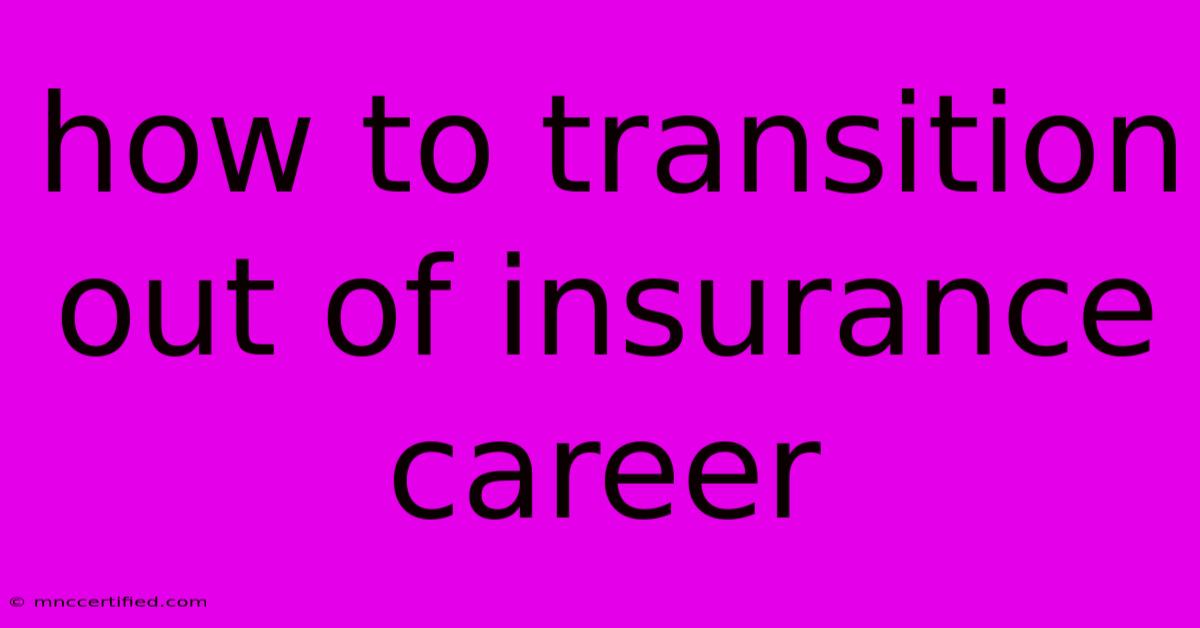How To Transition Out Of Insurance Career

Table of Contents
Tired of the Insurance Industry? A Guide to Transitioning Your Career
The insurance industry can be a stable and rewarding career path, but it's not for everyone. If you're feeling burnt out, unfulfilled, or simply ready for a change, transitioning out of insurance can feel daunting. But it doesn't have to be! With the right planning and strategy, you can successfully navigate a new career path.
Understanding Your Motivations:
Before you start crafting your exit strategy, it's crucial to understand why you want to leave the insurance industry.
- Are you seeking a different work environment? Perhaps you crave a more creative, collaborative, or fast-paced setting.
- Are you seeking a different type of work? Do you have a passion you want to pursue or skills you're eager to utilize?
- Are you driven by salary or career growth? Maybe you want to explore industries with higher earning potential or more defined career ladders.
Leveraging Your Insurance Skills:
Don't underestimate the transferable skills you've honed in your insurance career. These valuable assets can translate to a wide range of industries:
- Communication and Interpersonal Skills: Insurance professionals are adept at building rapport, explaining complex information clearly, and resolving conflicts.
- Analytical and Problem-Solving Skills: Insurance involves assessing risk, analyzing data, and developing solutions.
- Negotiation and Persuasion Skills: Insurance professionals are skilled negotiators, adept at persuading clients and closing deals.
- Compliance and Regulatory Knowledge: Your experience with insurance regulations can be valuable in industries with similar regulatory frameworks.
Crafting Your Transition Plan:
Now that you understand your motivations and skills, let's create a roadmap for your transition:
1. Research and Explore New Career Paths:
- Identify your interests: What are you passionate about? What type of work would truly engage you?
- Research industries and roles: Explore careers that utilize your existing skills and align with your interests. Websites like LinkedIn, Indeed, and Glassdoor can be helpful resources.
- Network: Connect with people in your desired fields through professional organizations, online forums, or networking events.
2. Develop Your Marketable Skills:
- Upskill: Consider taking courses or pursuing certifications that enhance your qualifications for your target career.
- Strengthen your resume: Highlight relevant skills and experiences from your insurance career and tailor them to the new roles you're targeting.
- Build a professional online presence: Update your LinkedIn profile, create a professional website, and cultivate an online presence that showcases your skills and expertise.
3. Secure Your Next Role:
- Target your job search: Focus on companies and roles that align with your interests and skillset.
- Craft compelling cover letters: Tailor each cover letter to the specific role and company, emphasizing your transferable skills and how they align with the employer's needs.
- Practice your interviewing skills: Prepare for common interview questions, research the company and the interviewer, and practice your responses.
4. Execute Your Transition:
- Inform your employer: Communicate your decision to leave respectfully and professionally.
- Transition gracefully: Assist in training your replacement and ensure a smooth handover of responsibilities.
- Embrace your new challenge: Be prepared to learn new skills, adapt to a new environment, and build new relationships.
Beyond the Transition:
Leaving the insurance industry can be a positive change, offering new opportunities for growth and fulfillment.
- Stay connected: Maintain connections with your former colleagues and network within your new industry.
- Continue learning: Stay up-to-date with industry trends and develop new skills to ensure career growth and adaptability.
- Celebrate your success: Acknowledge your accomplishments and celebrate your journey to a new and exciting chapter.
Remember, transitioning out of insurance is a journey, not a destination. By understanding your motivations, leveraging your skills, and following a structured plan, you can confidently navigate a new and fulfilling career path.

Thank you for visiting our website wich cover about How To Transition Out Of Insurance Career. We hope the information provided has been useful to you. Feel free to contact us if you have any questions or need further assistance. See you next time and dont miss to bookmark.
Featured Posts
-
How Vance Silenced His Critics With Power
Nov 07, 2024
-
Public Input Drives Sacramento County Law Enforcement Changes
Nov 07, 2024
-
Another Utsa Student Death Suicide Confirmed
Nov 07, 2024
-
Cubarsi Delivers E30 M Transfer News To Deco
Nov 07, 2024
-
Trump Election Musks Net Worth Jumps 15 Billion
Nov 07, 2024